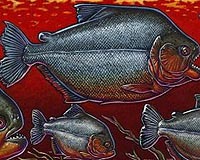| . |  |
. |
Windhoek (AFP) July 1, 2009 In a bid to save tens of thousands of baby seals being killed for their fur, Namibia animal rights activist are rushing to raise millions of dollars to buy out a fur company that buys the pelts. The annual commercial seal harvesting season officially opened on Wednesday with a quota of 85,000 pups due to be clubbed to death on the Namibian coast. "I got the offer from the Australian-based owner Hatem Yavuz to buy out his company for 14.2 million US dollars by mid-July and I have started an international online appeal to raise the funds," Francois Hugo of Seal Alert South Africa, a seal rehabilitation centre, told AFP by telephone from Cape Town. "I have placed the plea on YouTube and Facebook over the weekend requesting individuals worldwide to pledge 15 dollars each until the target is reached and many offers have already reached us," Hugo added. "Hatem Yavuz even offered to delay for two weeks the culling of the Cape Fur Seal pups and the shooting of 6,000 bulls by his Namibian partner companies which were allocated the quotas," Hugo added. The original deadline set by Yavuz last Friday to raise the money by July 1 was too short, he said. However an official in the Namibian fisheries ministry said the cull would kick off Wednesday, as agreed. The ministry set a three-year rolling quota back in 2007 of 85,000 seal pups annually plus 6000 bulls each year to contain Namibia's total seal population of some 850,000 animals. The bulls' dried genitals are popular in China where they are used for traditional medicines. More than 3,200 online signatures were put on the Internet portal Facebook by late Tuesday with an additional petition by an Australian animal rights group launched separately, urging the fur company owner in an open letter to stop buying seal pelts from Namibia. In May this year, the European Union banned imports and exports of all seal products in their 27 member states, including transporting these products through the EU to other parts of the world. The sparsely populated southern African country is famous for its wildlife and deserts, especially along its Atlantic "skeleton coast". The seals live on a group of islands off the southern coast. Share This Article With Planet Earth
Related Links Darwin Today At TerraDaily.com
 New Fossil Tells How Piranhas Got Their Teeth
New Fossil Tells How Piranhas Got Their TeethDurham NC (SPX) Jun 30, 2009 How did piranhas - the legendary freshwater fish with the razor bite - get their telltale teeth? Researchers from Argentina, the United States and Venezuela have uncovered the jawbone of a striking transitional fossil that sheds light on this question. Named Megapiranha paranensis, this previously unknown fossil fish bridges the evolutionary gap between flesh-eating piranhas and their ... read more |
|
| The content herein, unless otherwise known to be public domain, are Copyright 1995-2009 - SpaceDaily. AFP and UPI Wire Stories are copyright Agence France-Presse and United Press International. ESA Portal Reports are copyright European Space Agency. All NASA sourced material is public domain. Additional copyrights may apply in whole or part to other bona fide parties. Advertising does not imply endorsement,agreement or approval of any opinions, statements or information provided by SpaceDaily on any Web page published or hosted by SpaceDaily. Privacy Statement |